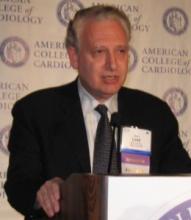Drug-eluting coronary stents have progressed substantially since the first models, the sirolimus-eluting Cypher stent and the paclitaxel-eluting Taxus stent, came onto the U.S.market in 2003 and 2004, respectively. As I wrote on this blog a few weeks ago, the second generation drug-eluting stents (DES) that are now either on the market—the everolimus-eluting Xience V/Promus stent—or on the way—the zotarolimus-eluting Resolute stent and the everolimus-eluting Platinum stent—have produced unprecedented levels of efficacy and safety for coronary stents, a true step beyond the first generation.
Physicians and patients should feel good about that, and they’ll need to be content with it too because there probably won’t be much further progress in widely available stent technology any time soon, at least according to one of the world’s top stent gurus, Martin B. Leon from Columbia University in New York.
Speaking in reply to a question during a forum on stents and coronary artery bypass surgery earlier this month at the annual meeting of the American Association for Thoracic Surgery, Dr. Leon gave a realistic and perhaps slightly bleak forecast for what the next decade or so holds for new stent technology.
“I think the incremental benefits we’ll get in next generation stents will be minimal. It will be extremely hard to get repeat-revascularization rates much below the 5% we generally see in the first year” with current second-generation DES, and the current low, long-term stent-thrombosis rates will be hard to beat as well. “The amount that would need to be invested to show any improvement will be difficult. I don’t think, with metallic-stent technology, that any future versions will be dramatically different.”
And what about bioabsorbable stents, which seem to shape up as the next big thing in coronary stent development? “Absorbable stents have some unique characteristics, but that is a 5-10 year pathway with many speed bumps and curves. Absorbable stents are the next great group to look for, but they will take many years to study adequately,” Dr. Leon warned.
—Mitchel Zoler (on Twitter @mitchelzoler)



